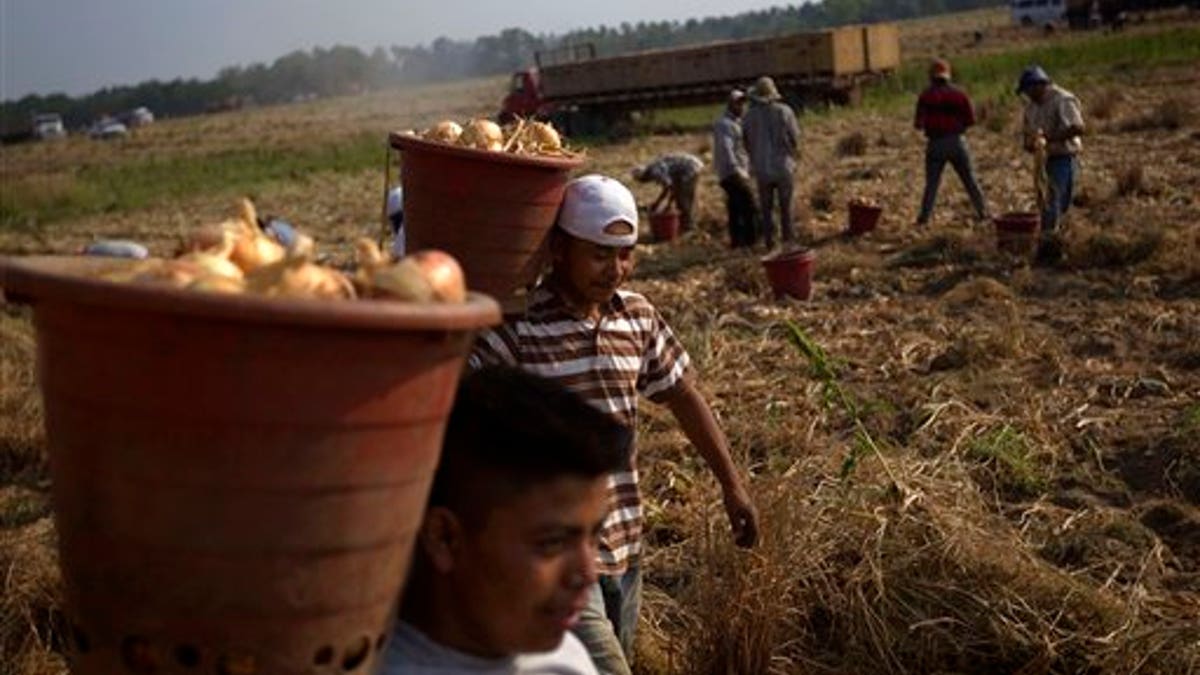
(AP Photo/David Goldman) (AP2011)
A study by the Georgia Agriculture Department of the state farm workforce shows that finding legal employees with the skill and desire to do labor-intensive harvesting is extremely difficult.
The reasons, says a report released Tuesday of the study’s findings, include the complexity and expense of government programs intended to help farmers employ guest workers, and the physically demanding nature of many agricultural jobs.
The Agriculture Department undertook the study after Georgia’s legislators passed a measure that targeted undocumented immigrants. The state General Assembly asked the agency to conduct a study of immigration's role in the agricultural industry, which the report described as “the state’s top economic driver.”
Farmers participating in the study said they have suffered roughly $10 million in crop losses because of the law, which many say has driven away workers.
“It is both fitting and convenient to turn to agriculture when launching a discussion on [immigration],” wrote state Agriculture Commissioner Gary Black in an introduction to the findings. “Non-resident immigrant laborers, those of legal and illegal status, harvest crops, milk cows, gin cotton and maintain landscapes.”
“Georgia farmers and agribusiness employers," Black wrote, "widely attribute the need for these workers due to the fact that local citizens do not generally possess or care to develop the specialized skills associated with agriculture and, further do not regularly demonstrate the work ethic necessary to meet the productivity requirements of the farm business.”
Other studies conducted in the state last year also indicated that the law appeared to be having an adverse impact on agricultural business.
The report said that the findings were preliminary and that more research was needed to assess what impact the new immigration law was having on agriculture.
But one thing had emerged clearly, it said: Congress must fix the nation's immigration system to make sure farmers have enough workers.
Black said a federal guest worker program is too cumbersome for farmers, many of whom said it was off-putting because of its expense and excessive paperwork. Many employers surveyed said they preferred to rely on word-of-mouth for finding workers.
When asked if they had difficulty finding workers, 56 percent said yes, and 36 percent said no. The rest said the question was no applicable to their business.
Asked the reasons for the difficulty in finding workers, many said “the work is too physically demanding and difficult for U.S. citizens (non-immigrants),” the report said. “Respondents believe that only immigrant workers are willing to do the tasks needed in their operations. An additional theme is that respondents believe that it is difficult to find qualified and trained workers to aid in their operation.”
The report said that employers reported paying their workers at or above the federal minimum wage, with some paying $15 per hour or more. But even with the state unemployment rate of nearly 10 percent, the report said, farm jobs remained difficult to fill.
Georgia tried using criminals on probation to fill some of the farm jobs, with mixed results. But while some farmers who agreed to employ people on probation cited some deficiencies, a few said that it was an option that deserved more consideration.
The report echoed many of the same concerns that Black voiced last year when he testified at a Senate subcommittee hearing on immigration enforcement and farm labor.
Proponents of stricter immigration laws say Americans would be more willing to do some of the hardest jobs immigrants do if the pay and conditions were better.
One group, Farmworker Justice, which advocates for migrant and seasonal farmworkers, called the report disappointing because it did not include the views of employees.
“The report gives these growers’ complaints more than ample space, but there are no voices of farmworkers, farmworker organizations,” said Bruce Goldstein, the group’s executive director.
“Commissioner Black's report is disappointing because the agricultural laborers – the focus of the report – play no role in the report. Despite lengthy surveys of growers and other agricultural business operators, the report lacks any input from the seasonal farmworkers who are supposed to be the main subject.”
This story contains material from The Associated Press.
Follow Elizabeth Llorente on Twitter: @Liz_Llorente
Elizabeth Llorente can be reached elizabeth.llorente@foxnewslatino.com
Follow us on twitter.com/foxnewslatino
Like us at facebook.com/foxnewslatino












































